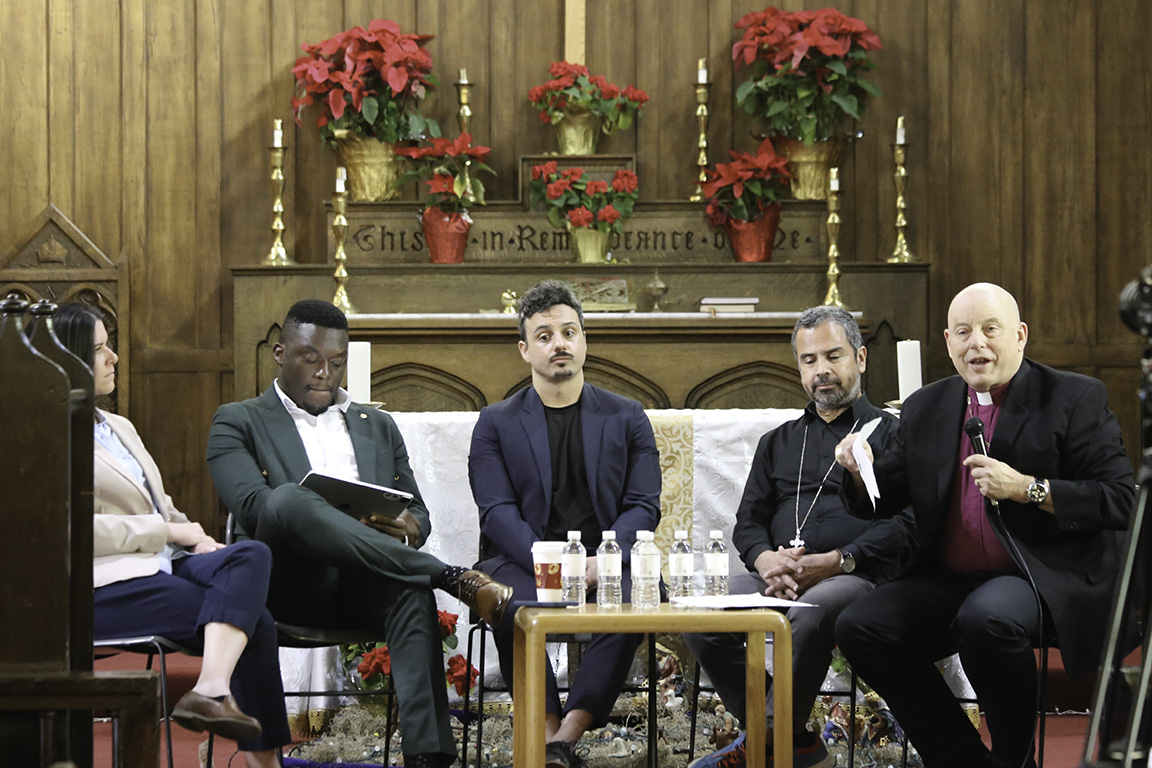
Panel members listen as moderator Bishop John Harvey Taylor introduces them and begins the discussion. Photos: Janet Kawamoto
[The Episcopal News – January 10, 2024] Migrants will be the biggest losers if the Biden Administration compromises current immigration policies in exchange for funding packages for Ukraine and other U.S. allies, a January 6 panel of immigration activists told a gathering at the historic Church of the Epiphany in Los Angeles.
“It is so sad to see that we are at the verge of trading humanity for war,” said Daniel Tse, who serves as asylum coordinator and co-founder of the Cameroon Advocacy Network of the Haitian Bridge Alliance. “I ask myself, where has our compassion gone? Where has our understanding of America gone?”
Sarah Kahn, interim director of the Center for Human Rights and Constitutional Law, which attempts to change immigration policy through legal action, agreed the result would be “devastating. It feels like every time there is an inch of progress, there’s a mile of pain. It will basically end asylum. Family detention will come back, along with detention of unaccompanied children. The conditions are going to be even worse than they already are, and there’s no reason. There should be a pathway to citizenship for everyone who’s here. It’s going to be so devastating that it’s hard to even articulate.”
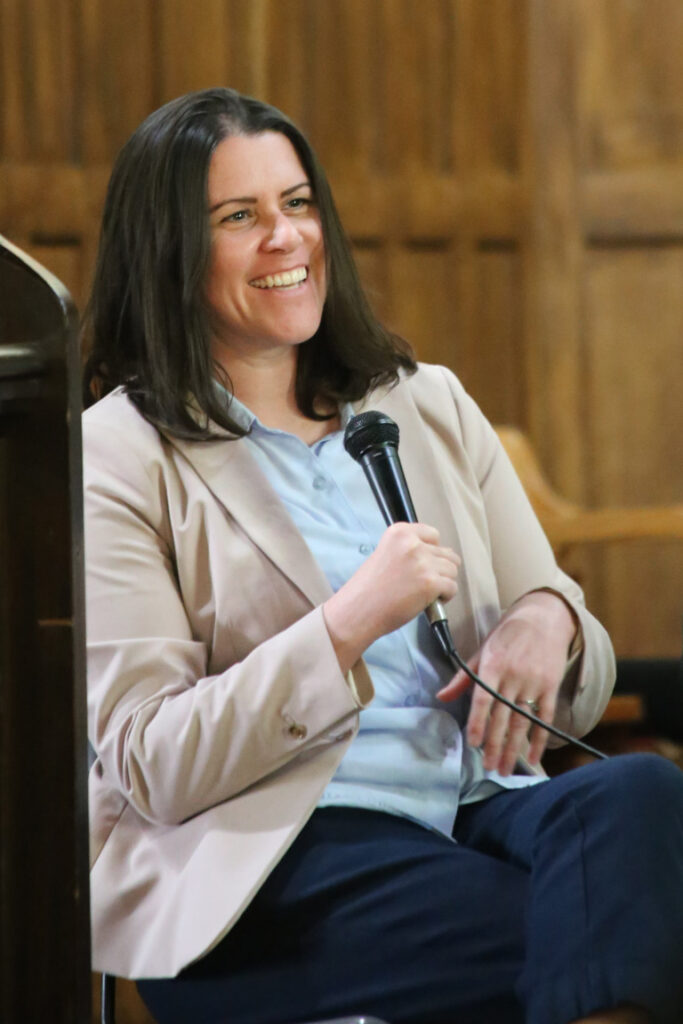
Sarah Kahn, interim director of the Center for Human Rights and Constitutional Law, took part in the panel discussion.
Bishop John Harvey Taylor, who moderated the panel, said the lack of political will, American vision, and Christian formation have fueled the current immigration crisis.
Politically, “we could come up with a system that is humane and practical and decent and reflective of the economy of immigration and the economy of the places in our country where immigrant workers are a vital part of the system,” Taylor said. Instead, he said, asylees and immigrant workers are treated as “convenient political scapegoats.”
Failure to recognize the United States and Central America as part of “a single cultural economic unit” represents a lack of vision, Taylor added. “In this continental economy there are nations where the United States, in the Cold War era and after, either as a result of ideological or political interference, or simply neglect, has been part of creating the problem that asylees are fleeing, which is economic and political instability. The United States has played a role in the history of these nations, and we have some accountability. Policymakers could find a way to look at our continent as a single cultural economic unit. We could if we wanted to, but we don’t.”
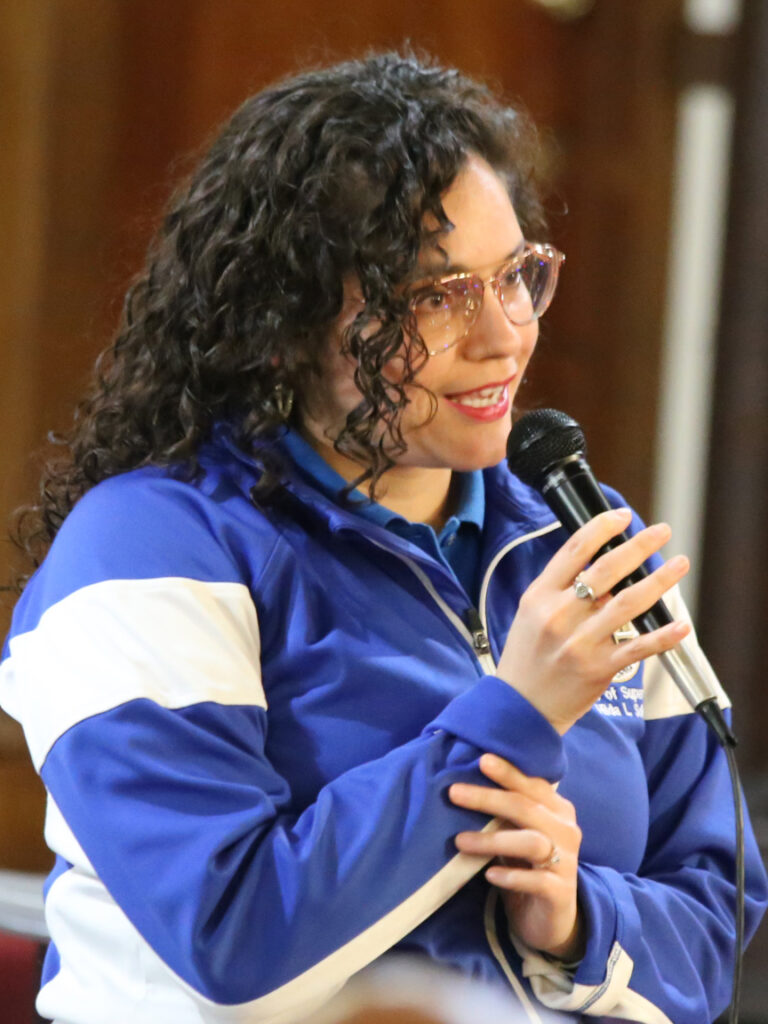
Daniella Urban, senior advisor in the office of Los Angeles County Supervisor Hilda Solis, answers a question regarding official policy toward migrants.
Thirdly, one can’t call oneself a Christian and demonize others, Taylor said. “I care less about what a sibling’s view about immigration policy is than I do about how they treat those who are victims of the system we have,” he told the gathering. “If, in order to be able to justify taking a harsh view on immigrant worker rights and asylee rights, it is necessary to objectify, and demonize someone who is made in the image of Christ, that is a failure of Christian formation. Christians can’t do that to people made in the image of God.”
The panel discussion was livestreamed and may be viewed here.
Daniella Urbina, a senior advisor in the office of Los Angeles County Supervisor Hilda Solis, also addressed the gathering. Solis is “the daughter of immigrants,” and has always championed their support, ensuring that “they have a home and that they feel welcome and that they have the resources to thrive in L.A. County,” Urbina said.
Solis helped to create the Office of Immigrant Affairs in L.A. County, which has programs and an investment of over $14 million, with $12 million of those funds going directly to contracts for organizations that serve immigrants. A groundbreaking program called Represent L.A. provides support to those facing deportation.
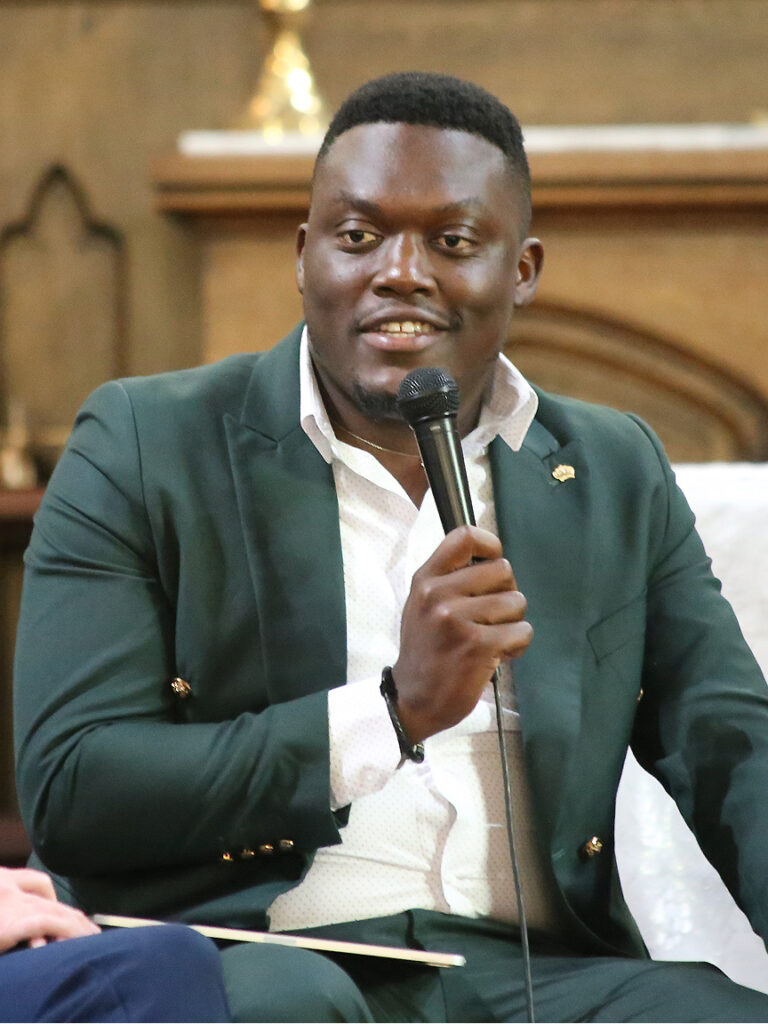
Daniel Tse, asylum coordinator and co-founder of the Cameroon Advocacy Network of the Haitian Bridge Alliance, shares personal experience of the treatment given migrants in the United States.
“As Texas continues to send buses to the county and city of Los Angeles, together along with several nonprofit partners that have helped us, we are going to continue welcoming those buses and find a way to ensure those folks on buses, or showing up at Union Station on the Greyhound, or at LAX, are connected to the resources they need, even if it means just connecting them to family sponsors already here,” Urbina said.
Racism and inhumane treatment at the U.S.-Mexico border as an asylee motivated Tse’s activism, he said. Although seeking asylum “the legal way” in 2019, Tse, who hails from Cameroon, said he was shoved to a wall, tackled, pushed to the ground, handcuffed, shackled around his waist and legs, and locked in a bus without food or water.
“Black migrants are being criminalized and treated with a higher level of scrutiny,” he said. During a court appearance while he was in detention, Tse said, a $17,500 bond was imposed upon him, compared to a $1,500 bond given to another migrant, who was not Black. “I asked myself the question; what documents did he show in court to prove that he’s not a flight risk, as compared to me?”
The dehumanizing treatment seeks “to break you, to criminalize you, to make you understand that you have no value, you are not a human, you’re not welcome here,” he said.
Kahn agreed, noting that her Jewish paternal grandparents were Holocaust survivors and were treated as refugees upon arrival, but later “welcomed into whiteness … (and) the privilege afforded to them when they began to be seen as white. They began to be seen as humans with value. That’s what we deny to people when … we don’t think about the fact that this is a family, or a kid, or a human being coming here to try to survive.”
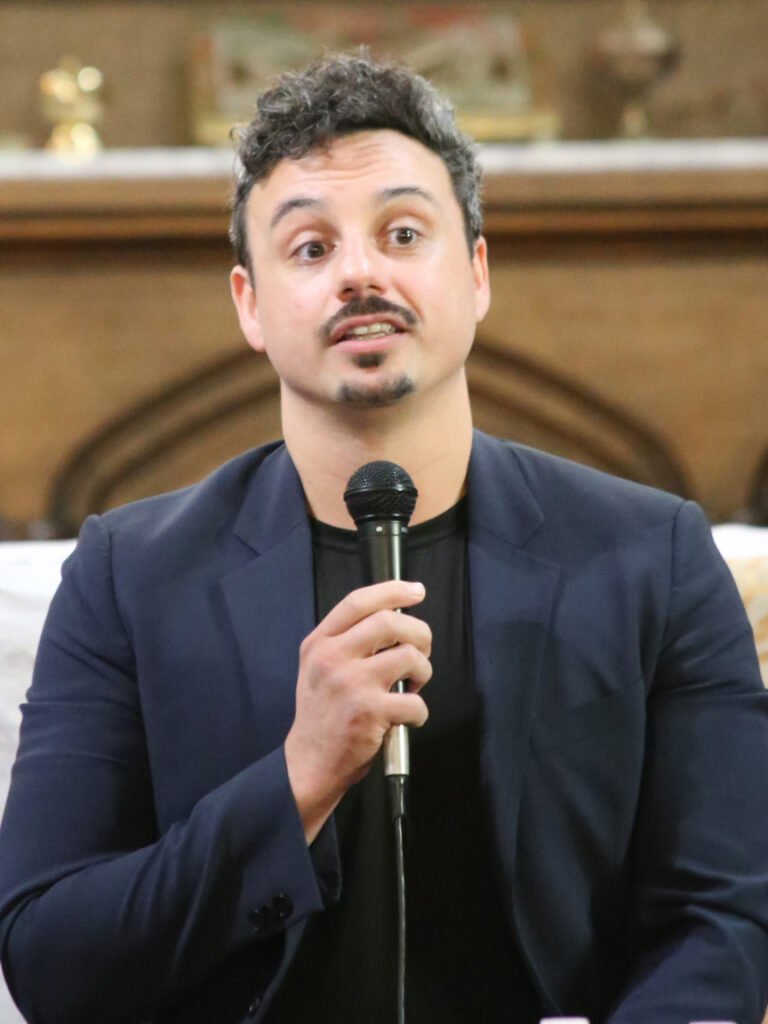
Josh Lopez-Reyes, executive director of the Echo Park Immigrant Center, decries xenophobia and the criminalization of immigrants.
Anti-immigrant sentiment often focuses on the false premise of “legally” immigrating, she added.
“For billions of people, there is no legal way to immigrate. People aren’t walking for hundreds of miles, they aren’t enduring abuse and detention and living without documentation by choice. It’s because there isn’t an opportunity to immigrate if that’s what somebody chooses to do. Ending criminalization and providing a pathway to citizenship is the most humanitarian and urgent need, for everybody.”
Panelist Josh Lopez-Reyes, executive director of the Echo Park Immigrant Center, said, “I’ve seen my father detained in a detention center. I’ve seen family members deported. We’re trying to address the xenophobia, the dehumanization that an unjust system has created. We’ve literally created the problem and criminalized it and are benefitting from it.”
The organization is creating opportunities to broadcast the message that the immigrant community is more than victims. “We are powerful people,” he said. EPIC, in 2021, “really started listening to the community and the parents, the elders, who wanted their children to have better opportunities. That’s one of the main reasons people make the sacrifice of going through all the harm to come here.”
EPIC has joined the Welcomes Collective, a group of local non-profit agencies, aiding, supporting, and offering resources to those bused to Los Angeles from Texas and elsewhere.
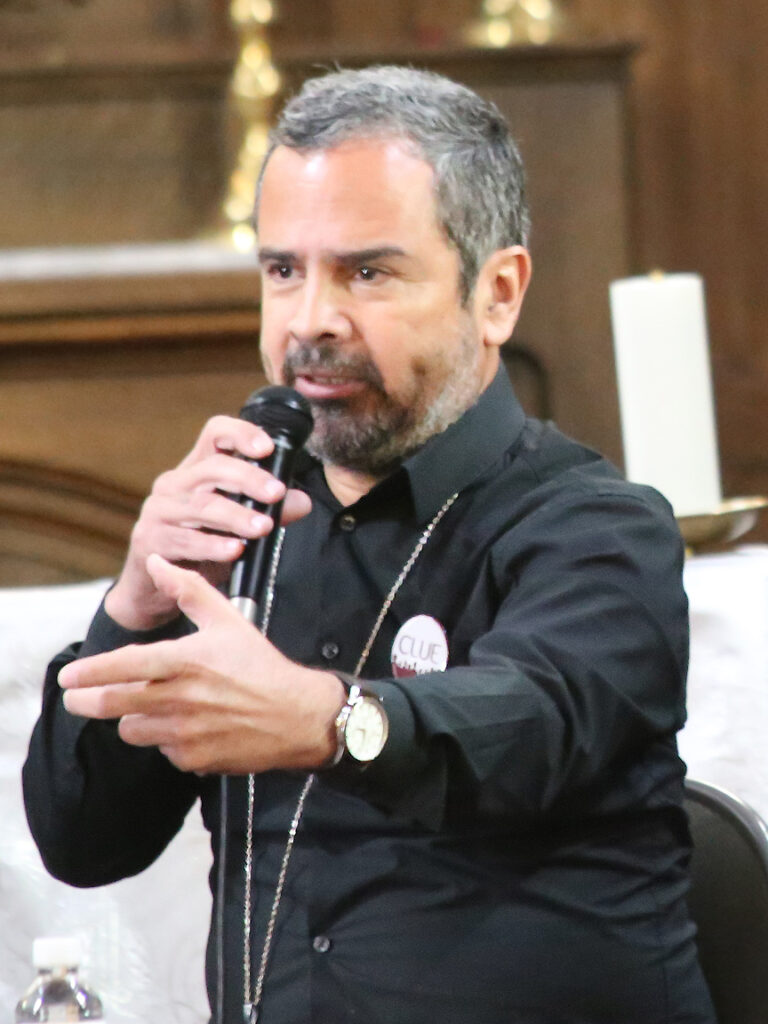
Guillermo Torres, immigration program director for Clergy and Laity United for Economic Justice, outlined efforts to welcome immigrants.
Guillermo Torres, immigration program director for Clergy and Laity United for Economic Justice, said CLUE hopes to involve more faith communities in the Welcomes Collective.
“Our faith communities have played many roles … from the Civil Rights to Sanctuary movements,” he said. While CLUE has been working to shut down the Adelanto Detention Center because of unsafe and inhumane conditions, the economic justice advocacy agency is also attempting to change hearts and to restore hope, Torres said.
“Some of our churches have been housing migrants already, from buses, borders and detention.” A Feb. 9 meeting in Los Angeles will bring faith communities together to talk about how they might participate in the Collective. For more information, contact Torres at gtorres@cluejustice.org.
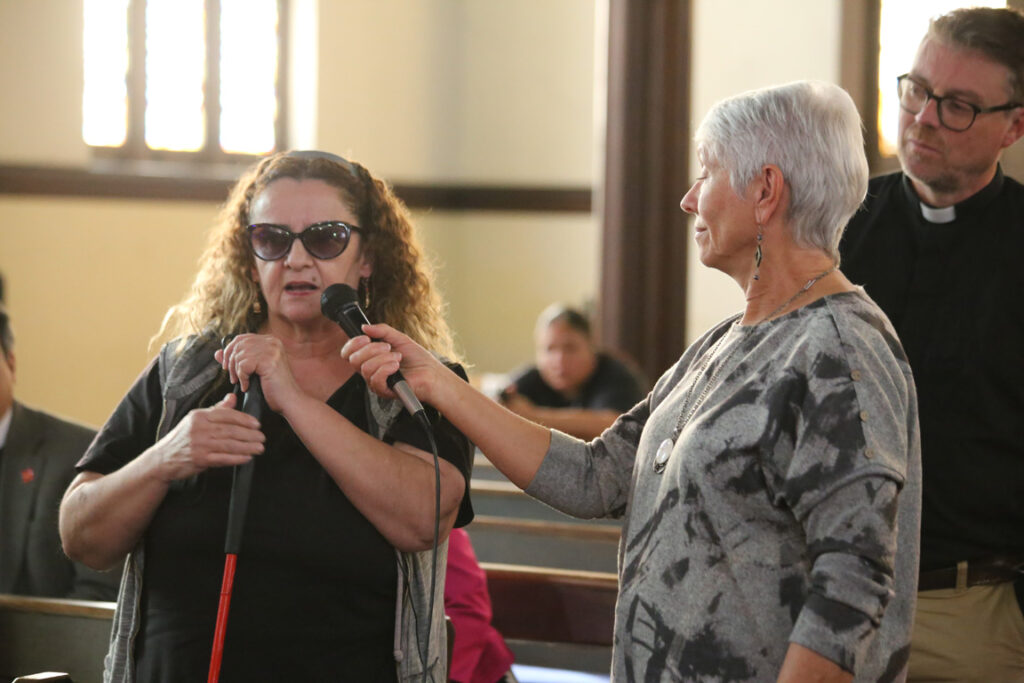
Grace Dyrness of All Saints Church, Pasadena, and the Rev. John Watson, priest-in-charge of Church of the Epiphany, assist as an attendee asks the panelists a question in Spanish at the immigration forum.
Clergy will be the first ones on the buses to welcome migrants, he added: “Open up your spaces as pastors, as ministers, to invite asylum seekers to share their stories. Listen to their stories, see what solidarity means to them, versus what does solidarity mean to me? We think sometimes we know what the immigrant wants. How about listening to those affected directly? What does solidarity mean to them?”
Established in 1886, Church of the Epiphany, located at 2808 Altura Street, is a landmark for civil rights work including the Chicano movement and the United Farm Workers organizing by Dolores Huerta and the late Cesar Chavez. The activist newspaper La Raza was published in the church basement.
The panel discussion was part of a weekend celebration themed “Epiphanies: A Festival of Discovery” that also included a resource fair and fiesta and announcement of the forming Lydia Lopez Center for Community Empowerment (see related story here).
